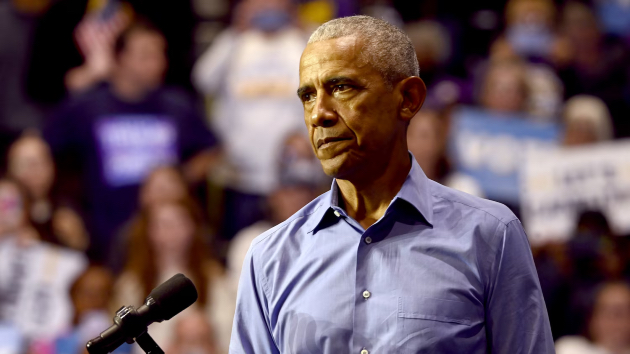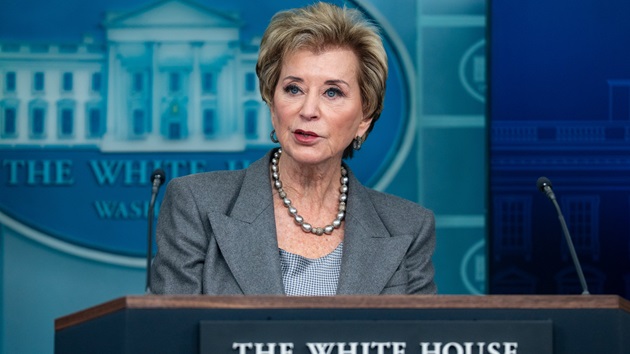Nikki Haley to end presidential campaign, as last major Trump rival exits GOP race: Sources
Written by ABC Audio All Rights Reserved on March 6, 2024

(WASHINGTON) — Former U.N. Ambassador Nikki Haley is planning on suspending her campaign for president in the wake of a slew of Super Tuesday losses, campaign sources tell ABC News.
This now leaves leaving former President Donald Trump as the last major candidate standing among Republicans, all but guaranteeing him the party’s nomination on his way to a likely rematch with President Joe Biden in November.
Haley will reportedly not immediately endorse Trump though she is expected to deliver remarks to the press at 10:00 in Charleston, South Carolina.
One of the first to launch her 2024 bid, Haley is now the last to exit after more than a year of campaigning.
“America is not past our prime — it’s just that our politicians are past theirs,” Haley told a crowd of 1,500 people in Charleston, South Carolina, at her campaign’s launch. “We won’t win the 21st century if we keep trusting politicians from the 20th century.”
That theme became a core part of her messaging throughout the primary, with Haley continuously telling supporters at events that she was running against Trump because the country needed a “new generational leader.”
But despite her name recognition and deep political experience, which includes two terms as governor of South Carolina and serving in Trump’s administration as the U.S. ambassador to the United Nations, Haley started off as a relatively dark horse in the race.
Having pursued an initial strategy of avoiding focusing her attacks on Trump, she ultimately emerged as his top contender, besting Florida Gov. Ron DeSantis — once the favorite in the race — and former New Jersey Gov. Chris Christie, Trump’s harshest critic.
By the end of January, the field of 13 candidates had been reduced to just two: Haley and Trump.
She ultimately placed second in New Hampshire after a third-place finish in Iowa before losing her home state of South Carolina — which she once promised would be the state that brought it home for her. While she later achieved her first victory in Washington, D.C.’s primary days before Super Tuesday, it proved to be too little, too late.
In her attempts to gain ground, Haley increasingly sharpened her attacks against the former president after losing in New Hampshire, and then again after South Carolina, warning that she wasn’t sure if Trump would follow the Constitution and going so far as to call his potential nomination “suicide for our country.”
Seeking to draw a stark contrast between her and Trump’s visions for the Republican Party, she argued that nominating Trump to lead the party in November would spell disaster for candidates up and down the ballot.
“The Republican Party that I’m seeing happen is one that isn’t focused on fiscal discipline, is one that isn’t focused on national security, and is one that’s becoming more about one man instead of about a party” Haley told reporters in Utah days before Super Tuesday.
“This is now becoming a party that’s pushing people out of our party, as opposed to the Republican Party I believe in where you bring more people in. So this primary has always been about what direction is the Republican party going and what direction is America going,” she said.
During the final weeks and months of her campaign, Haley built a relatively broad coalition of supporters that included Republicans, moderates and, occasionally, Democrats, who, for one reason or another, sought to leave Trump in the GOP’s past.
While Haley initially pledged to support Trump as the Republican nominee even if he was convicted of a felony, she was singing a different tune by the end of her campaign.
In February, she argued there was “no way that the American people are going to vote for a convicted criminal” for president, and a few weeks later, suggested that she could renege on the Republican National Committee pledge she signed to support the eventual Republican nominee — which was a requirement of participating in the party’s televised debates.
“I get to do what I want to do,” Haley told Fox News on Tuesday, adding that she never heard Trump pledge to support her if she became the nominee.
“If he refused to sign the pledge, I don’t have to go forward, but I’ll make that decision on my own,” she said.
In the end, Haley continued to draw considerable crowds at events, fueling speculation that she could attempt a third-party bid — a prospect she repeatedly rejected.
“My purpose has never been to stop Trump at all costs. Like most Americans, I have a handful of serious concerns about the former president. But I have countless serious concerns about the current president,” she told reporters and supporters in a state of the race address delivered days before South Carolina’s primary.
Though Haley’s was unable to secure significant electoral momentum, her campaign’s balance sheet certainly did not reflect that of a losing candidate.
She largely avoided the financial woes typical of ailing campaigns, raising $11.5 million in January — her best month for fundraising on record — even following back-to-back losses to Trump. In fact, she outraised Trump that month by $2.7 million, and in February claimed to have raised another $12 million across her three fundraising committees.
Haley also secured the highly coveted endorsements of New Hampshire Gov. Chris Sununu and Americans For Prosperity, the Super PAC backed by the Koch network. She raised millions from high-power Republican donors, including billionaire hedge fund manager Paul Singer, Citadel Cheif Ken Griffin, and WhatsApp co-founder Jan Koum. She even raised $250,000 from Democratic megadonor Reid Hoffman.
But that support was ultimately not enough to overcome Trump, and after her punishing defeat in South Carolina, Americans For Prosperity pulled back its support.
Copyright © 2024, ABC Audio. All rights reserved.

 KVSP
KVSP 





